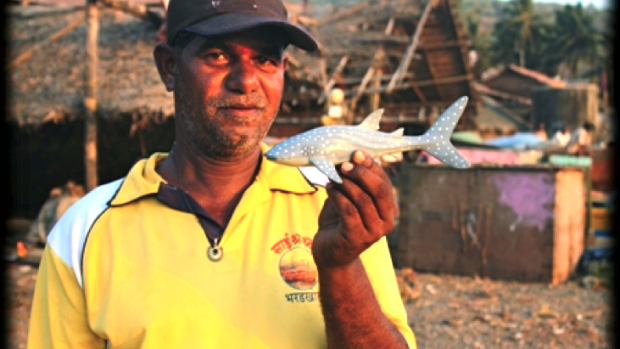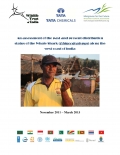Grants :: Small Grant Facilities :: An assessment of the past and present distribution status of the Whale Shark (Rhincodon typus) along the west coast of India
An assessment of the past and present distribution status of the Whale Shark (Rhincodon typus) along the west coast of India

A fisherman holds up a Whale Shark toy in support of the con ... , Gujarat, India © WTI, 2012
Objectives
The objectives of this project were to:
- Whale shark distribution across the west coast of India and, threats affecting them are documented
- Recovery plans are developed for whale sharks in collaboration with respective range states harboring whale shark hotspots
Background
Whale sharks (Rhincodon typus) are the largest species of fish and one of the largest filter feeders in the marine world. They have a wide global range and are known to utilize and migrate through India’s marine and coastal habitats. Although reports of organized hunting along the west coast have been encountered in the past, evidence from states other than Gujarat is relatively low. Since the launch of Wildlife Trust of India’s (WTI) whale shark campaign in 2004, and the subsequent scientific studies initiated in 2008 a great deal of awareness has been created on the plight of this species, predominantly in the coastal regions of Gujarat. This has lead to a ban on organized hunting of the species and the development of multifaceted conflict mitigation measures including whale shark rescue protocols and a compensation scheme for fishermen to release sharks trapped in their fishing nets.
However, there is an imperative to extend such conservation efforts across the entire coastline of India as the species is known for its geographically wide range. Without a comprehensive whale shark protection plan for the entire coastline, all state specific efforts that have or will be implemented to protect the species will be rendered futile. To realize this goal, the first step was to collate all available information on whale shark presence along the coastlines, including information on organized/opportunistic hunting and beaching events. This information has helped identify potential hotspots in respective states for subsequent conservation activities. The next step will be to work with Forest Departments of the respective states, in drafting recovery plans for the protection and enhancement of the whale shark population. This will be developed and submitted to the Ministry of Environment and Forests (MoEF) for acceptance and implementation within each state.
WTI has been designated to conduct further research on whale sharks and associated marine fauna and habitats and to develop recovery plans for whale sharks. These recovery plans will be implemented through the involvement of various state forest departments (Proceedings of the Consultation Workshop of the Sub-Committee on Conservation of Marine Species with Other Experts for Development of Species Recovery Plans and Marine Protected Areas in India, held between 6th and 7th March, 2009 at the Wildlife Institute of India, Dehradun). This project has conducted rigorous questionnaire-based surveys across the west coast of the country, in order to collect first hand information on whale shark sightings. The team will simultaneously liaise with forest departments at state and local levels. WTI and MFF will organize meetings and workshops to prepare recovery plans for the states from where evidence of temporal aggregation of whale sharks has been gathered.
Target beneficiaries
Central and State Departments of Environment and Fisheries, and Animal Husbandry, Dairying, and Fisheries
Local fishermen
mINSTLocal shell collectors, traders, and Self Help Groups involved in the ornamental shell industry
State and Central Department of Environment and Forests, and Department of Animal Husbandry, Dairying, and Fisheries
Coastal Zone Managers
- See more at: http://mangrovesforthefuture.org/grants/small-grant-facilities/india/commercially-important-gastropod-shell-resources-and-trade-in-india-distribution-status-and-conservation-strategies/#sthash.bKp4FqEd.dpufMLocal shell collectors, traders, and Self Help Groups involved in the ornamental shell industry
State and Central Department of Environment and Forests, and Department of Animal Husbandry, Dairying, and Fisheries
Coastal Zone Managers
- See more at: http://mangrovesforthefuture.org/grants/small-grant-facilities/india/commercially-important-gastropod-shell-resources-and-trade-in-india-distribution-status-and-conservation-strategies/#sthash.bKp4FqEd.dpufOutputs
Development and implementation of state level recovery plans for the whale shark in Karnataka, Maharashtra, Goa and Kerala
Accomplishments and challenges
One of the outcomes from the west coast fishermen survey is that at least four whale shark aggregation sites along the west coast of India including Lakshadweep Island have been identified for the first time. Of the 274 respondents who reported to have sighted the Whale Sharks during fishing operation, 83 respondents from Mumbai, Thane, Raigad reported to have sighted whale sharks off Gujarat coast especially near the Saurashtra coast and 55 respondents from Raigad, Ratnagiri and Sindhudurg reported to have sighted whale sharks off the Malvan coast of Maharashtra.
Of the 236 respondents who reported to have sighted whale sharks during fishing operation in Karnataka, 115 respondents from Uttar Kannada, Udupi and Dakshin Kannada reported to have sighted whale sharks more or less close to Netrani Island in Karnataka and 25 respondents from Uttar Kannada reported to have sighted whale sharks off the Malvan coast at Maharashtra.
Based on the Kerala and Lakshadweep fishermen observations, whale shark sightings were reportedly more in the following group of islands, Androth, Pitti, Suheli, Chinnapara, PeriyaparaBangaram and Minicoy. Most of the whale sharks landed on the Kerala coast were reported by the interviewees to be mainly from Lakshadweep waters.
MFF India and WTI have met with State Wildlife Wardens from all West Coast States towards developing the recovery plans for whale sharks; these are being drafted now. Policy briefs are similarly being developed to raise awareness of the findings of this study.
Contributions to cross-cutting themes
Climate change is a significant threat that will impact endangered marine fauna and their habitats in adverse ways. It is important that the distribution and significant habitats and migratory pathways of whale sharks be determined in order that steps can be taken to increase their resilience to pressures, including climate change.
Lessons Learned
Over the past five years Whale Shark landings have been reported in various states of west coast of India except in Gujarat primarily due to the level of awareness among fishermen of whale sharks. In Gujarat the level of awareness increased up to 69%, after WTI and IFAW (International Fund for Animal Welfare) launched the Whale Shark Campaign in January 2004 in collaboration with the Gujarat Forest Department, Tata Chemicals and Gujarat Heavy Chemicals Ltd. As such the population of whale sharks is increasing (based on observational data) with awareness levels (and reporting incidence), and not necessarily because of any other factors.
Related News
Saving our speckled giants
West coast of India 16 Sep 2013
Country: India
Topic: Capacity development, Management Assessment and Monitoring, Capacity Building ...
The largest fish in the world, whale sharks, have faced population declines globally. In Gujarat, India, they were once killed in large numbers, fetching up to USD 2,250 for fishermen. This was curbed in May 2001 when the species was afforded the hig...
Project Facts
Country
Location
West coast of India: Karnataka, Maharashtra, Goa, Kerala, and the Lakshwadeep Islands
Topic
- Knowledge for Management
- Strategies for Management
- Monitoring, Learning and Evaluation
- Civil Society Engagement
- Capacity Building
- Sustainable Livelihoods
- Coastal Governance
- Integrated Coastal Planning
- Marine Protected Areas
- Capacity development
- Gender equality
- Knowledge management and communications
Duration
31st Dec 2011 to 31st Mar 2013
MFF Grant Amount
INR 834,900
Co-financing Partner
Co-financing from WTI: INR 600,000
Implementing Partner
Mr. Prem Jothi
Field Officer
Wildlife Trust of india
prem@wti.org.in
Related Images
Related Publications

An assessment of the past and present distribution status of the Whale Shark (Rhincodontypus) along the west coast of India
Wildlife Trust of India SGF Project - Final report
Author: Wildlife Trust of India
Publisher: MFF India
Posted on: 2nd Sep 2014
Category: SGF (Small Grant Facility)
Size: 2.8 MB






